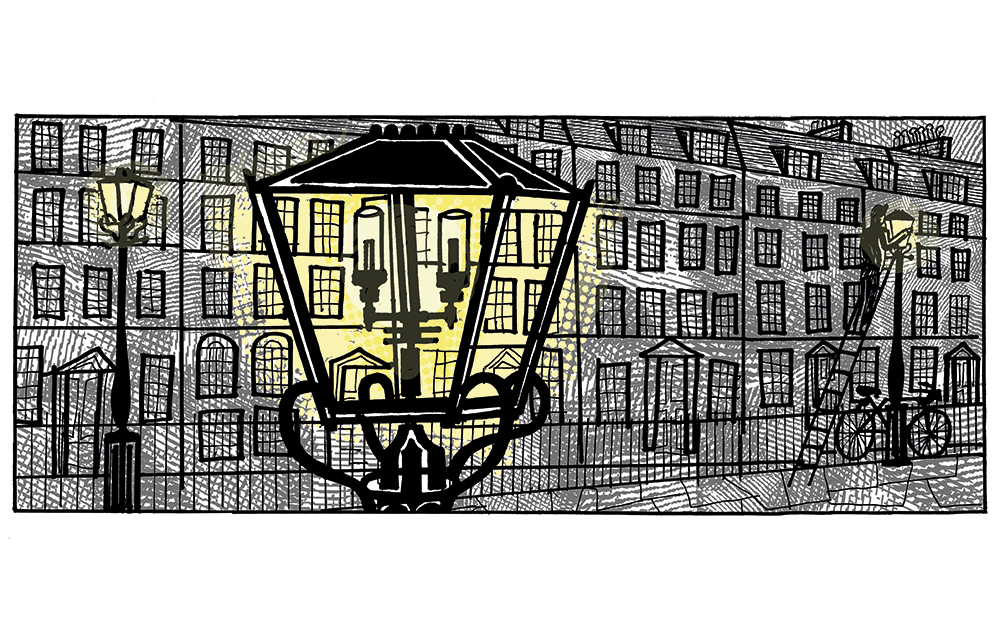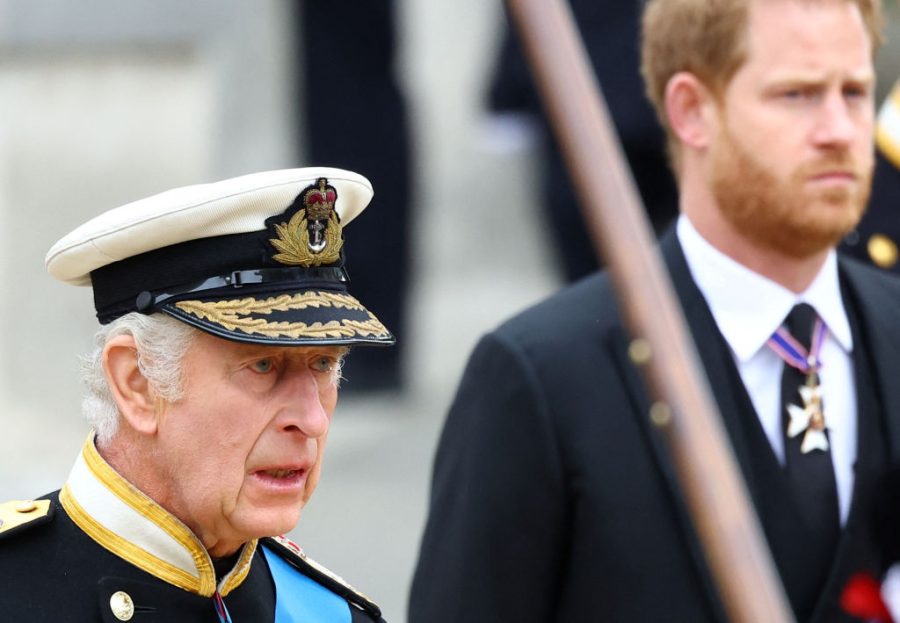Christopher Howse has narrated this article for you to listen to.
I was growing impatient with a recent blog by Sam Altman, who runs OpenAI, promising progress, universal prosperity, ‘a space colony, and the discovery of all of physics’ through artificial intelligence. I won’t go over that ground now, because I suddenly sat up at a passing remark he made: ‘Nobody is looking back at the past, wishing they were a lamplighter.’
Stephen’s task for Paddington council was to cycle round with his ladder fixing street lamps on the blink
I’m not so sure. I used to know a lamplighter and I miss his company. His name was Stephen Fothergill, and in the 1980s he was a welcome sight in the French pub in Dean Street, Soho, late in the evening. Tall and grey-haired with a sharp nose that often seemed nipped with cold, he would be dressed in a long drab raincoat. He spoke quietly and occasionally laughed lightly with a noise a little less than a snort.
He stood at the so-called ‘deep end’ of the pub, the north side of the little interior, where poets and painters talked and shouted, leaving the copywriters and what he called the ‘pornocrats’ at the shallow end.
He drank bitter beer in half-pints (the landlord Gaston Berlemont in any case refusing to serve pints). It was easier to hear Stephen when the underground-train intensity of crowding had thinned out, on a Sunday night perhaps.
He became a lamplighter in the 1950s while learning the trumpet in his spare time. His special task for Paddington council was to cycle round with his ladder dealing with street lamps on the blink. The short ladder, like a window cleaner’s, reached the crossbar on the lamppost.
Gas streetlights have a relative beauty, like steam trains. I mean that when gaslight was introduced, some resented its artificial glare, just as some hated railways cutting through the countryside. Ruskin hated both, becoming as incandescent as a gas mantle in denouncing the harsh new lighting in 19th-century Venice.
But now gas lights seem to give a gentle glow, hardly illuminating more than a circle round the lamppost. It is the sort of thing that appeals to the King, who, since his years as Prince of Wales, has encouraged wild flowers and grasses in the Mall on the verges outside the garden walls of Clarence House and St James’s Palace. At night under the trees they are gently lit by old gas lampposts.
The attraction of a gas lamppost popped up from the subconscious of C.S. Lewis, when he wrote The Lion, the Witch and the Wardrobe, lighting the snowy clearing through which walked Mr Tumnus, the faun. Lewis felt obliged to explain, in The Magician’s Nephew, how such a contraption came to be in Narnia in the first place.
Stephen’s story was less of a fairy tale. In his lamplighting days he lived in an unfurnished room in Delamere Terrace, near the house seen in Lucian Freud’s ‘Interior at Paddington’. (As well as the horrible yucca plant, the canvas depicts Harry Diamond, the pugnacious photographer, wearing a raincoat rather like Stephen’s.) Stephen’s room faced the wrong way for a view towards the Grand Union Canal.
Stephen embraced the radical poverty yoked to the kind of bohemianism he never forsook. Soho pubs and cafés were as much home as Paddington. To Paddington, though, his girlfriend and wife-to-be Jackie moved in with him. It was a brave move. There was no bathroom. A Primus stood on the carpetless floor where old newspapers and magazines lay. Quart beer bottles stood about, awaiting return for the twopence deposit reclaimable on each. An orange box sheltered some books, a couple of enamel mugs and a packet of biscuits. On a refectory table were the instruments of Stephen’s twin vocation: a trumpet and a pair of bicycle clips for him to cycle off with his ladder.
In his quietly memorable memoir The Last Lamplighter (published by Alan Ross, the editor of the London Magazine for 40 years, as one of his last projects), Stephen recounts how Jackie, for all his love, died aged 58 from heroin addiction. It wasn’t tragedy on its own that made him the kind of lamplighter that someone might wish to be. It had more to do with a continuing interest in conversation, art, music and the side of life not dependent on electronic devices and private jets.
Oliver Bernard, the poet who was the eldest brother of The Spectator’s late Low Life columnist Jeffrey Bernard, had known Stephen in Soho since before the second world war. He once expressed in a sentence some essential virtues in Stephen’s life. ‘If I ever need to remind myself of the virtues of constancy and good manners, or of the fact that people can hold very different views from my own without its actually mattering,’ he wrote, ‘I’m always glad to see Stephen, because he reminds me of them.’
His intelligence, unlike the gaslight, was anything but artificial.







Comments